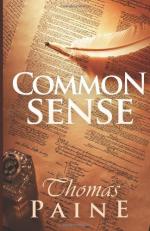
|
| Name: _________________________ | Period: ___________________ |
This test consists of 15 multiple choice questions and 5 short answer questions.
Multiple Choice Questions
1. How long would news take to travel from England to America if the two countries were to reconcile at this point?
(a) Two or three weeks.
(b) Two or three months.
(c) Four or five weeks.
(d) Four or five months.
2. How does Paine describe society?
(a) As a gift.
(b) As a blessing.
(c) As a good example.
(d) As a perfect model.
3. Why does England constantly need a foe to battle?
(a) To prove their place in the world.
(b) To increase trade agreements.
(c) To increase jobs through war.
(d) To provide a reason for its high taxes.
4. According to Paine, what is the difference between society and government?
(a) Positivism versus negativism.
(b) Right versus wrong.
(c) North versus South.
(d) East versus West.
5. When does Paine wish the Revolution had begun?
(a) Eight days later.
(b) Eight months earlier.
(c) Eight months later.
(d) Eight days earlier.
6. What point does Paine use Joan of Arc as an example to support?
(a) The strength of the American soldiers.
(b) America's sacrifice for independence.
(c) The weakness of the British rule.
(d) America's political views.
7. How did the men in the American army fight Howe?
(a) They fought for an ideal and property.
(b) They fought for an ideal, not property.
(c) They fought neither for an ideal nor property.
(d) They fought for property, not an ideal.
8. How many days before the taking of the Bastille did Marquis de La Fayette make a speech?
(a) Five.
(b) Four.
(c) Two.
(d) Three.
9. What city did the British incorrectly assume was the center of America when they attacked it?
(a) Baltimore.
(b) New York.
(c) Dallas.
(d) Philadelphia.
10. What replaced hopelessness during a long battle, as Paine recounts?
(a) Intelligence.
(b) Boldness.
(c) Fear.
(d) Vigor.
11. What are the decrees outlining the foundation for a new French government called?
(a) The August Decrees.
(b) The September Decrees.
(c) The November Decrees.
(d) The December Decrees.
12. What are the rumors about the reason behind Burke's pamphlet?
(a) He did it out of hatred for other countries.
(b) He did it for financial reasons.
(c) He did it out of loyalty for his country.
(d) He did it to receive notoriety.
13. Whom was the Rights of Man presented to?
(a) John Adams.
(b) Abraham Lincoln.
(c) George Washington.
(d) Benjamin Franklin.
14. What saddens Paine about the analogies made to good and solid government?
(a) They involve Britain.
(b) They involve Greece and Rome.
(c) They involve France and Spain.
(d) They involve Britain, Greece, Rome, France, and Spain.
15. Why do Englishmen defend their king?
(a) Out of reason, rather than national pride.
(b) Out of national pride, rather than reason.
(c) Out of neither reason nor national pride.
(d) Out of both reason and national pride.
Short Answer Questions
1. How does Paine describe the Quakers?
2. What does Paine use examples from scripture to explain?
3. How does Paine describe Burke's analysis of France?
4. What does Paine believe should never separate the elected from the electors?
5. What prevents the British from effectively governing America?
|
This section contains 534 words (approx. 2 pages at 300 words per page) |

|




